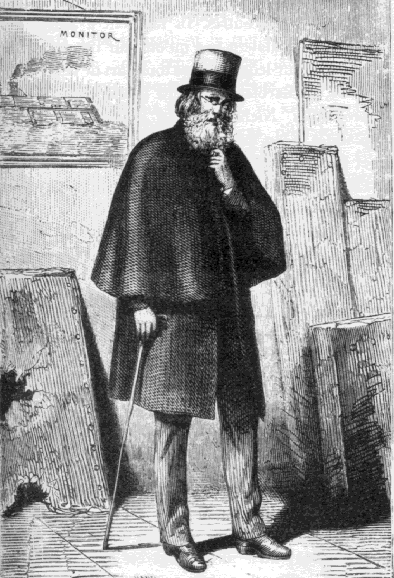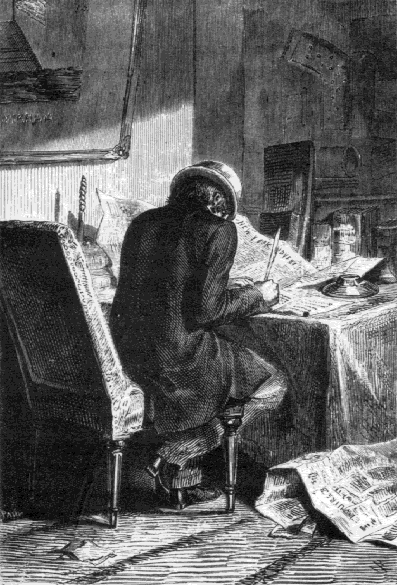
The American public took a lively interest in the smallest details of the enterprise of the Gun Club. It followed day by day the discussion of the committee. The most simple preparations for the great experiment, the questions of figures which it involved, the mechanical difficulties to be resolved-- in one word, the entire plan of work-- roused the popular excitement to the highest pitch.
The purely scientific attraction was suddenly intensified by the following incident:
We have seen what legions of admirers and friends Barbicane's project had rallied round its author. There was, however, one single individual alone in all the States of the Union who protested against the attempt of the Gun Club. He attacked it furiously on every opportunity, and human nature is such that Barbicane felt more keenly the opposition of that one man than he did the applause of all the others. He was well aware of the motive of this antipathy, the origin of this solitary enmity, the cause of its personality and old standing, and in what rivalry of self-love it had its rise.
This persevering enemy the president of the Gun Club had never seen. Fortunate that it was so, for a meeting between the two men would certainly have been attended with serious consequences. This rival was a man of science, like Barbicane himself, of a fiery, daring, and violent disposition; a pure Yankee. His name was Captain Nicholl; he lived at Philadelphia.

Most people are aware of the curious struggle which arose during the Federal war between the guns and armor of iron-plated ships. The result was the entire reconstruction of the navy of both the continents; as the one grew heavier, the other became thicker in proportion. The Merrimac, the Monitor, the Tennessee, the Weehawken discharged enormous projectiles themselves, after having been armor-clad against the projectiles of others. In fact they did to others that which they would not they should do to them-- that grand principle of immortality upon which rests the whole art of war.
Now if Barbicane was a great founder of shot, Nicholl was a great forger of plates; the one cast night and day at Baltimore, the other forged day and night at Philadelphia. As soon as ever Barbicane invented a new shot, Nicholl invented a new plate; each followed a current of ideas essentially opposed to the other. Happily for these citizens, so useful to their country, a distance of from fifty to sixty miles separated them from one another, and they had never yet met. Which of these two inventors had the advantage over the other it was difficult to decide from the results obtained. By last accounts, however, it would seem that the armor-plate would in the end have to give way to the shot; nevertheless, there were competent judges who had their doubts on the point.
At the last experiment the cylindro-conical projectiles of Barbicane stuck like so many pins in the Nicholl plates. On that day the Philadelphia iron-forger then believed himself victorious, and could not evince contempt enough for his rival; but when the other afterward substituted for conical shot simple 600-pound shells, at very moderate velocity, the captain was obliged to give in. In fact, these projectiles knocked his best metal plate to shivers.
Matters were at this stage, and victory seemed to rest with the shot, when the war came to an end on the very day when Nicholl had completed a new armor-plate of wrought steel. It was a masterpiece of its kind, and bid defiance to all the projectiles of the world. The captain had it conveyed to the Polygon at Washington, challenging the president of the Gun Club to break it. Barbicane, peace having been declared, declined to try the experiment.
Nicholl, now furious, offered to expose his plate to the shock of any shot, solid, hollow, round, or conical. Refused by the president, who did not choose to compromise his last success.
Nicholl, disgusted by this obstinacy, tried to tempt Barbicane by offering him every chance. He proposed to fix the plate within two hundred yards of the gun. Barbicane still obstinate in refusal. A hundred yards? Not even seventy-five!
"At fifty then!" roared the captain through the newspapers. "At twenty-five yards! and I'll stand behind!"
Barbicane returned for answer that, even if Captain Nicholl would be so good as to stand in front, he would not fire any more.
Nicholl could not contain himself at this reply; threw out hints of cowardice; that a man who refused to fire a cannon-shot was pretty near being afraid of it; that artillerists who fight at six miles distance are substituting mathematical formulae for individual courage.
To these insinuations Barbicane returned no answer; perhaps he never heard of them, so absorbed was he in the calculations for his great enterprise.
When his famous communication was made to the Gun Club, the captain's wrath passed all bounds; with his intense jealousy was mingled a feeling of absolute impotence. How was he to invent anything to beat this 900-feet Columbiad? What armor-plate could ever resist a projectile of 30,000 pounds weight? Overwhelmed at first under this violent shock, he by and by recovered himself, and resolved to crush the proposal by weight of his arguments.

He then violently attacked the labors of the Gun Club, published a number of letters in the newspapers, endeavored to prove Barbicane ignorant of the first principles of gunnery. He maintained that it was absolutely impossible to impress upon any body whatever a velocity of 12,000 yards per second; that even with such a velocity a projectile of such a weight could not transcend the limits of the earth's atmosphere. Further still, even regarding the velocity to be acquired, and granting it to be sufficient, the shell could not resist the pressure of the gas developed by the ignition of 1,600,000 pounds of powder; and supposing it to resist that pressure, it would be less able to support that temperature; it would melt on quitting the Columbiad, and fall back in a red-hot shower upon the heads of the imprudent spectators.
Barbicane continued his work without regarding these attacks.
Nicholl then took up the question in its other aspects. Without touching upon its uselessness in all points of view, he regarded the experiment as fraught with extreme danger, both to the citizens, who might sanction by their presence so reprehensible a spectacle, and also to the towns in the neighborhood of this deplorable cannon. He also observed that if the projectile did not succeed in reaching its destination (a result absolutely impossible), it must inevitably fall back upon the earth, and that the shock of such a mass, multiplied by the square of its velocity, would seriously endanger every point of the globe. Under the circumstances, therefore, and without interfering with the rights of free citizens, it was a case for the intervention of Government, which ought not to endanger the safety of all for the pleasure of one individual.
In spite of all his arguments, however, Captain Nicholl remained alone in his opinion. Nobody listened to him, and he did not succeed in alienating a single admirer from the president of the Gun Club. The latter did not even take the pains to refute the arguments of his rival.
Nicholl, driven into his last entrenchments, and not able to fight personally in the cause, resolved to fight with money. He published, therefore, in the Richmond Inquirer a series of wagers, conceived in these terms, and on an increasing scale:
No. 1 ($1,000).-- That the necessary funds for the experiment of the Gun Club will not be forthcoming.
No. 2 ($2,000).-- That the operation of casting a cannon of 900 feet is impracticable, and cannot possibly succeed.
No. 3 ($3,000).-- That is it impossible to load the Columbiad, and that the pyroxyle will take fire spontaneously under the pressure of the projectile.
No. 4 ($4,000).-- That the Columbiad will burst at the first fire.
No. 5 ($5,000).-- That the shot will not travel farther than six miles, and that it will fall back again a few seconds after its discharge.
It was an important sum, therefore, which the captain risked in his invincible obstinacy. He had no less than $15,000 at stake.
Notwithstanding the importance of the challenge, on the 19th of May he received a sealed packet containing the following superbly laconic reply:
"BALTIMORE, October 19.
"Done."BARBICANE."